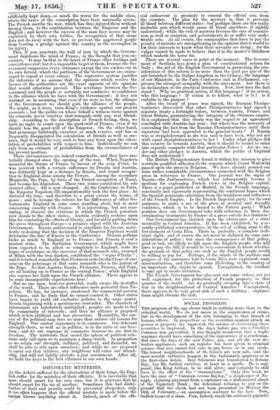DIPLOMATIC MYSTERIES.
As the Aehivi suffered for the aberrations of their kings, the Eng- lish suffer for the mistakes of their officials. It is inevitable that man should smart for his own sins, but it is grievous that he should smart for the sin of another. Sometimes this bad distri- bution of fault and penalty could be prevented altogether, only it too o4en happens that the official mistake is made before the nation knows anything about it. Indeed,. much of the offi- cial endeavour is precisely to conceal the official nets from the country. The plea for the mystery is, that it prevents ill blood between different states : but perhaps there are few really desirable acts which would cause ill blood anywhere if rightly understood ; while the veil of mystery favours the sins of commis- sion as well as omission, and governments do or suffer very unde- sirable acts. At all events, the communities that have to pay the penalty of mistake are strengthening in the opinion that it would be for their interests to know what their servants are doing ; for the vulgar cannot be made to believe that it is the master's blindness which maketh the horse fat.
There are several cases in point at the moment. The Govern- ment of Sardinia lays down a plan of constitutional reform for Italy ; the aid of the English Government in promoting the con- sideration of this reform is no more than the quid pro quo of the aid furnished by the Italian kingdom in the Crimea; the language of our Ministers, in the Paris Conference and in Parliament, ex- presses the strongest sympathy with the movement : but there is no declaration of the practical intention. Now, how does the fact stand ? Why no practical action, if this languor ? if no action, why this language ? If action is to follow, what is it ? is it suitable to the purpose ?
After the treaty of peace was signed, the Russian Plenipo- tentiaries discovered that other Plenipotentiaries had signed a separate treaty a fortnight before? between Austria, France, and Great Britain, guaranteeing the integrity of the Ottoman empire. kis explained that this treaty was the sequel to an agreement concluded with Austria last year : but where was the necessity of concealing the fact from the Russian Plenipotentiaries until their signature had been appended to the general treaty ? If Russia was so straightforward as she was said to have been, why not act with equal straightforwardness to her ? Under what pledges did this country lie towards Austria, that it should be bound to enter into separate compacts with that particular Power ? Are we un- der any other pledges to Austria, which the public of England does not understand ?
The British Plenipotentiary found it within his mission to give a certain qualified adhesion to the censure which Count Walewski passed upon the press in Belgium. We have already pointed out some rather remarkable circumstances connected with the Belgian press in reference to France. One journal was the organ of Russia—the Independence, which has subsequently become a
i medium for expressing French views in the Belgian capital. There is a paper published at Madrid, in the French language, constantly and vigorously representing the continued hopes which the Spanish peninsula entertains from the traditions and influences of the French Empire. Is the French Imperial party, for its own purposes, to make a use of the press in neutral and friendly countries, which is to be denied to the Patriot party ? What position does our Government take with reference to these dis- criminating treatments by France of a press outside her frontiers ?
Our Government has insisted upon the observance of a strict neutrality in Central America. It has been exhibited, by a re- cently-published correspondence, in the act of selling arms to the Government of Costa Rica. There is, probably, a complete tech- nical right, and of course the act must be dictated by some con- siderations of policy ; but since the consequences of that policy, good or bad, are likely to fall upon the English people, who will have to pay the bill, it would be very convenient to know whether the grounds of that policy are such as the English people would be willing to pay for. Perhaps, if the whole of the motives and purpose of the assistance lent to Costa Rica were explained, some misconstruction, and therefore some ill-feeling in the country of an important ally, might be spared. Unexplained, the incident is very apt to create irritation. The French Government has also sent out some orders, not yet well explained, for the protection of French property in that quarter of the world. Are we gradually creeping into a state of war in the neighbourhood of Central America ? Unexplained, there appears to be very great risk of such a drifting : explana- tions nught obviate the risk.


























 Previous page
Previous page